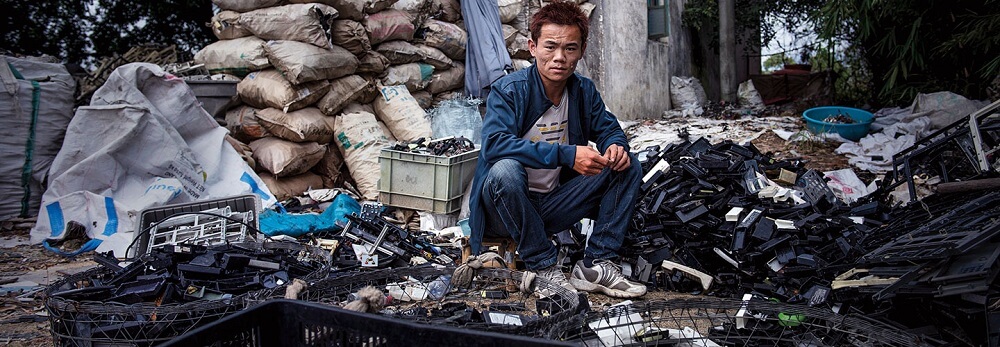The large amount of computer waste that is generated worldwide, has to go somewhere. But we have never stopped to think where our computers, telephones, appliances ... stop going to the so-called garbage cities, which causes them great environmental problems and above all sanitary ones since they are exposed to very toxic products.
Electronic scrap, electronic waste or technological waste are known for the WEEE concept (Waste electrical and electronic equipment). Inadequate treatment of WEEE can cause serious impacts on the environment and endanger human health.
The United Nations Environment Program (UNEP) estimates that about 50 million tons of electronic devices that are discarded annually are generated.
There are large dumps where Western countries put their WEEE. The largest landfill in the world is in China, specifically in the city of Guiyu.
It is estimated that 150,000 people work in that city to treat the garbage that arrives, mainly from the United States, Canada, Japan and South Korea.
Windows that overflow monitors, streets taken by mountains of keyboards with worn letters, piles of those modems that squeaked when connected, batteries that decompose next to a ditch and tangles of wires that give off a black smoke to be burned to extract from them the copper. No matter where you look, in the small Chinese city of Guiyu there is always electronic junk in sight.
In Guiyu most of the recycling work is carried out in about 5,500 small stores, yards, and homes. There are parents who have no problem in handling all kinds of dangerous components with their baby in their arms. Others even employ their children, teenagers, during the weekends.
The economy of the town is based on these workshops and the salaries are five times higher than those that the workers had when they were engaged in agriculture. However, the price they pay for their health is very high. Due to the constant exposure to lead, mercury and cadmium suffer neurological problems, skin diseases and their children are born with congenital malformations.
The worst method: the plastics catch fire and smell the poisonous vapors to know what kind of plastic it is or submerge in small amounts of gold from computer plates that are then thrown into the streams.
For this, 70% of babies are born with 50% more blood lead than normal and rivers have 2,400 times the normal level of this metal.
A scary fact: from the beginning of years, it was prohibited to recycle in the street to hide it from the cameras and human rights organizations.
The UN estimates that 80% of the technological waste generated worldwide is exported to Third World countries where there is no regulation.
Another gigantic point to pour WEEE is located in Ghana, Africa, which indirectly employs around 30,000 people, and contributes between 105 and 268 million dollars per year to the country. Ghana imports around 215,000 tons each year.
Pollution samples taken from soils determine very high levels of heavy metal concentrations, such as lead, copper or mercury.

